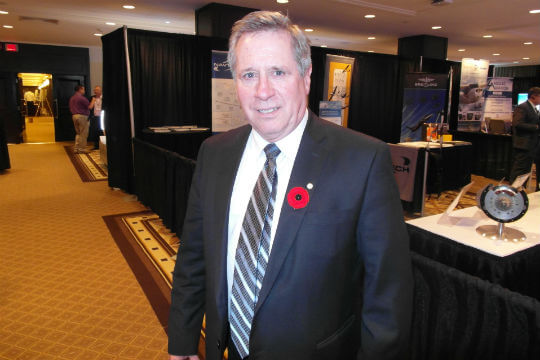Estimated reading time 5 minutes, 24 seconds.

ATAC President and CEO, John McKenna, visits the tradeshow at the association’s annual conference in November. Lisa Gordon Photo
Close to 500 participants travelled to Montreal for the Air Transport Association of Canada’s 81st annual National Aviation Conference and Tradeshow, held from Nov. 2 to 4, 2015. ATAC is the national voice of Canada’s commercial aviation and flight training industries, representing a total of 184 members from coast to coast.
During the show, Skies sat down with association president and CEO, John McKenna, to discuss the group’s policies and priorities for the coming year. With a renewed board of directors—including newly-appointed chair, Heather McGonigal of Transwest Air—McKenna said ATAC is primed to tackle several big industry issues.
“Our industry is looking good,” said McKenna, who took the helm of ATAC in 2009. “We’ve weathered the recession quite well. The demand for our services is growing by about three to four per cent per year.”
Despite the positive overall outlook, however, he named several key priorities for the association in 2016. McKenna said ATAC has reached out to newly-appointed Liberal Transport Minister, Marc Garneau, to ensure he understands the industry’s viewpoint.
First, said McKenna, the levels of service at Transport Canada are declining. While the demand for air transport is growing, the regulator’s budgets have been slashed—and that makes it difficult to turn even simple paperwork around quickly.
“When you add a plane to a fleet, the operating certificate needs to be amended,” he explained. “But getting that amendment can take months, even when that airplane type is already being operated. Transport Canada staff are instructed to respond to these kinds of requests within a certain time period, but they don’t. That is highly frustrating, and these are the things that take forever.”
McKenna added that there is also significant regional disparity in service levels, with local Transport Canada inspectors interpreting regulations differently.
The second item on ATAC’s priority list for the new transport minister is the legislative approach to flight crew fatigue risk management. The association, along with a number of other similar industry groups, is fighting proposed regulatory changes that McKenna said would seriously impact the industry—especially seasonal and specialty operators, and particularly those operating in the north. “We worked hard to get Transport to understand that,” he commented. “We’re saying the existing SMS (safety management system) framework is the way to regulate fatigue in Canada. Why do you need a second parallel system?”
Other key issues on the front burner include finding a compromise between public safety and individual privacy. As brought to light by the Germanwings tragedy in March 2015, ATAC says a compromise must be developed whereby Transport Canada will notify employers about loss of privileges for commercial pilots, air traffic controllers, and aircraft maintenance engineers.
ATAC has also registered its concern about laser attacks on aircraft, mandatory flotation devices for seaplane passengers and crew, the safe operation of unmanned aerial vehicles (UAVs), and climate change initiatives—and that list is not exhaustive. McKenna also said it’s about time that the aviation industry is recognized for being an important economic driver rather than a highly-taxed cash cow.
“We pay the highest ATSC (Air Travellers Security Charge) fees in the world. How can we get them to understand that we are an economic engine?” asked McKenna. “For many years, we did not have a champion in Transport. We’ve had Ministers that had multiple portfolios and met with us once a year, checked off that box, and then heard the same things the next year.”
As he looks ahead to 2016, McKenna is excited about the “new blood” on the 24-member ATAC board of directors.
“We have representation from every region of Canada,” he said. “We have a very dynamic new chair, Heather McGonigal, who is incredibly disciplined. Frankly, we’re no longer an old boys’ club. Tracy Medve (past chair) led the way, and Heather is following her. Everyone recognizes her tremendous potential.”
“There are a lot of challenges facing us,” continued McKenna. “We need to make sure the new government understands the vital role we play in this country, and that we’re not looking for a handout—we’re just looking to be recognized as the important industry we are.”
He said he is working in cooperation with other industry associations to establish an aviation caucus on Parliament Hill, something that doesn’t currently exist in Ottawa. “That would really help us to get on the radar.”








